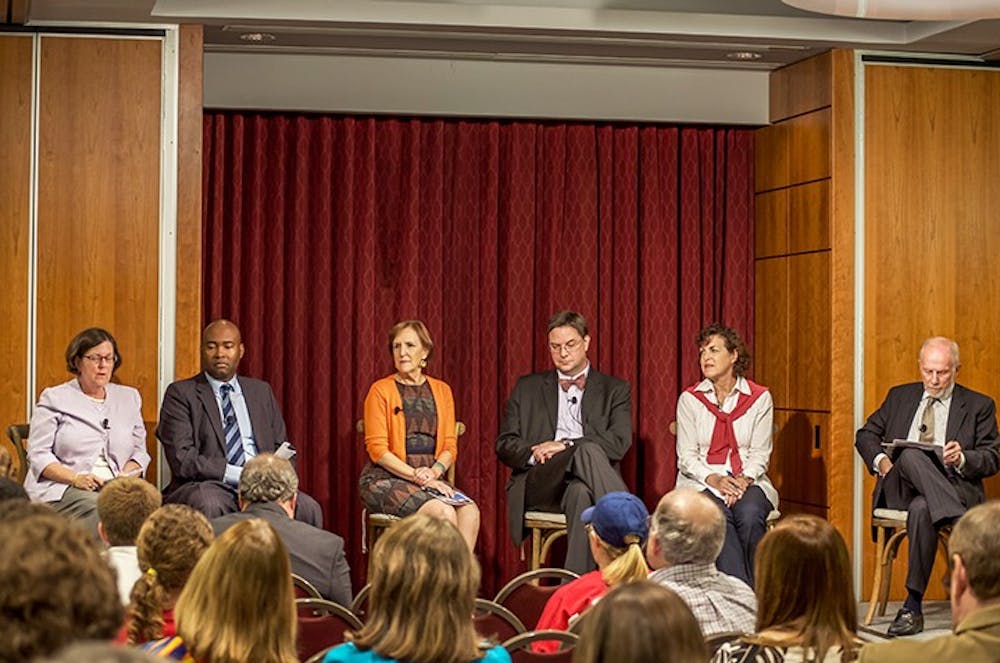Capstone House was buzzing with political chatter Tuesday when a five-person panel convened for a discussion on the 2016 primaries in South Carolina.
The discussion occurred in light of CNN's upcoming Republican presidential nomination debate, set to broadcast Wednesday evening at 8 p.m.
Featured were The Washington Post’s Karen Tumulty, RealClearPolitics’ Alexis Simendinger, Winthrop University professor and Winthrop Poll director Scott Huffmon, USC political science professor Laura Woliver, and South Carolina Democratic Party chairman Jaime Harrison. South Carolina Republican Party chairman Matt Moore, who was slated to participate in the event, was unable to attend due to last-minute extenuating circumstances.
Courtesy of SGTV
The panel, sponsored by the College of Arts and Sciences and Department of Political Science, was moderated by College of Information and Communications Dean Charles Bierbauer, a former Washington correspondent for CNN, and organized by long-time USC professor and former Democratic National Committee chairman Don Fowler.
The event fell just over a week before the university plays host to two contenders for the Republican nomination, Kentucky Sen. Rand Paul and businessman Donald Trump, who will speak on Sept. 23 at Russell House and the Koger Center respectively.
The panel stressed the significance of South Carolina as the first presidential primary in the south and one of the first in the nation, a fact that draws much national attention to the state, Tumulty included.
“South Carolina is just so crucial,” Tumulty said. “Every cycle it seems like something truly, truly strange and unexpected happens down here, so as often as I can get down here I really want to do that.”
She went on to note that South Carolina is the most diverse of the first three states to vote for candidates.
Fowler highlighted its tendency to correctly predict the eventual nominee for both parties.
“The South Carolina primaries have been amazingly accurate,” he said.
With regard to the Republican field, issues such as the rise of Donald Trump and the abnormally large number of candidates vying for the nomination were addressed.
Huffmon highlighted the impact of Trump’s presence on the Republican debate stage and stressed that he is not to be taken lightly.
“No one should ever dismiss Donald Trump at this point,” he said. “His polling numbers have been sustained … his personality is absolutely going to drive [the CNN debate].”
With respect to the very large Republican field, Huffmon noted that if the number of candidates dividing up the vote weren’t so big, an outsider like Trump would probably have less impact, and his lead wouldn't be as pronounced.
The Democratic field was also discussed at length, especially the threat that Vermont Sen. Bernie Sanders poses to the chances of former Secretary of State Hillary Clinton and the possibility that Vice President Joe Biden may still enter the race.
“Coming into the state, Bernie Sanders had a challenge,” Huffmon said. “He has to build that trust that’s very important to the African American population. There’s a loyalty to the Clinton brand … but Vice President Biden is also very beloved in the African American base of the party.”
Audience members were given the opportunity to pose their own questions to the expert panel at the end of the event, and touched on a wide variety of subjects including the electoral college breakdown for 2016, the viability of anti-establishment candidates with regard to a lack of experience, the number of presidential debates and much more.
The event drew a variety of attendants, including first-year international business student Matthew Hagadorn and first-year civil engineering student Joseph Lafond, both of whom thought the panel achieved its goal of helping students and other voters to better understand the process surrounding presidential primaries in South Carolina.
“It exceeded my expectations,” Hagadorn said. “Everyone on the panel seemed like they were very, very well-informed and had a lot of experience.”
“It was extremely informative and I’m extremely glad I got the chance to come,” Lafond said. “I got to learn a lot about the political process and how experts look at these kinds of issues and how they make their decisions about how they think these kinds of things are going to go.”

